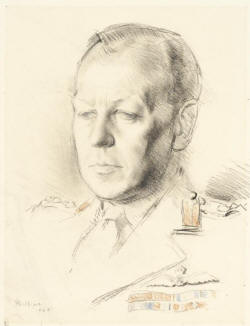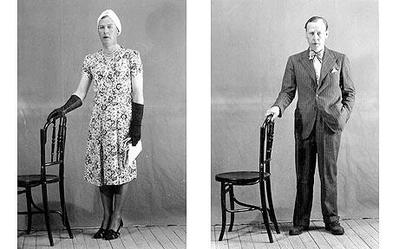

Queer Places:
802 Raleigh House, Dolphin Square, London
S.W.I,
 Brigadier Dudley Wrangel Clarke, CB, CBE (27 April 1899 – 7 May 1974) was an officer in the British Army, known as a pioneer of military deception operations during the Second World War. His ideas for combining fictional orders of battle, visual deception and double agents helped define Allied deception strategy during the war, for which he has been referred to as "the greatest British deceiver of WW2".[2] Clarke was also instrumental in the founding of three famous military units, namely the British Commandos, the Special Air Service and the US Rangers.
Dudley Wrangel Clarke is described by Ben Macintyre in Operation Mincemeat:
The True Spy Story that Changed the Course of World War 11(2010) as
`Unmarried, nocturnal and allergic to children', having 'a flair for the
dramatic that invited trouble. For the Royal Tournament in 1925, he mounted a
pageant depicting imperial artillery down the ages, which involved two
elephants, thirty-seven guns and fourteen of the biggest Nigerians he could
find. He loved uniforms, disguises and dressing up.' In 1940 Dudley was
summoned to Egypt and ordered to set up a special section of intelligence for
deception operations in the Mediterranean. The Cairo-based section was known
as the 'A' Force. In October 1941 Dudley was bailed out of a Spanish jail
dressed as a woman. Ben Macintyre said, 'A Spanish police photograph shows
this master of deception in high heels, lipstick, pearls, and a chic cloche
hat, his hands, in long opera gloves, de-murely folded in his lap. He was not
supposed to even be in Spain, but in Egypt.' His fellow spy chiefs were
unimpressed. Guy Liddell of MI5 noted: 'he was dressed as a woman complete
with brassiere [...] What on earth was the blighter thinking of? A chap might
go in disguise, if needed, but in a brassiere?' The incident was brought to
the attention of the prime minister,
Winston Churchill, but there
is no record of how he reacted. As for Dudley, there was no long-term damage
to his career in the British Army.
Brigadier Dudley Wrangel Clarke, CB, CBE (27 April 1899 – 7 May 1974) was an officer in the British Army, known as a pioneer of military deception operations during the Second World War. His ideas for combining fictional orders of battle, visual deception and double agents helped define Allied deception strategy during the war, for which he has been referred to as "the greatest British deceiver of WW2".[2] Clarke was also instrumental in the founding of three famous military units, namely the British Commandos, the Special Air Service and the US Rangers.
Dudley Wrangel Clarke is described by Ben Macintyre in Operation Mincemeat:
The True Spy Story that Changed the Course of World War 11(2010) as
`Unmarried, nocturnal and allergic to children', having 'a flair for the
dramatic that invited trouble. For the Royal Tournament in 1925, he mounted a
pageant depicting imperial artillery down the ages, which involved two
elephants, thirty-seven guns and fourteen of the biggest Nigerians he could
find. He loved uniforms, disguises and dressing up.' In 1940 Dudley was
summoned to Egypt and ordered to set up a special section of intelligence for
deception operations in the Mediterranean. The Cairo-based section was known
as the 'A' Force. In October 1941 Dudley was bailed out of a Spanish jail
dressed as a woman. Ben Macintyre said, 'A Spanish police photograph shows
this master of deception in high heels, lipstick, pearls, and a chic cloche
hat, his hands, in long opera gloves, de-murely folded in his lap. He was not
supposed to even be in Spain, but in Egypt.' His fellow spy chiefs were
unimpressed. Guy Liddell of MI5 noted: 'he was dressed as a woman complete
with brassiere [...] What on earth was the blighter thinking of? A chap might
go in disguise, if needed, but in a brassiere?' The incident was brought to
the attention of the prime minister,
Winston Churchill, but there
is no record of how he reacted. As for Dudley, there was no long-term damage
to his career in the British Army.

Born in Johannesburg and brought up near London, Clarke joined the Royal Artillery as an officer in 1916 but transferred to the Royal Flying Corps after finding he was too young to fight in France. He spent the First World War learning to fly, first in Reading and then Egypt. Clarke returned to the Royal Artillery in 1919 and had a varied career doing intelligence work in the Middle East. In 1936 he was posted to Palestine, where he helped organise the British repression of the 1936 Arab uprising.[3] During the Second World War, Clarke joined John Dill's staff and proposed and helped implement, an idea for commando raids into France – an early form of the British Commandos. In 1940, Archibald Wavell called Clarke to Cairo and placed him in charge of strategic deception. As a cover, he was employed to set up a regional organisation for MI9, a British escape and evasion department. The following year Clarke received a war establishment and set up Advanced Headquarters 'A' Force with a small staff to plan deception operations. Once satisfied with the department's structure, he pursued intelligence contacts in Turkey and Spain. In late 1941 Clarke was called to London, where his deception work had come to the attention of Allied high command. Shortly afterward, while in Madrid, he was arrested wearing women's clothing, in circumstances that remain unclear. He was released and after being questioned by the governor of Gibraltar, allowed to return to Cairo. During Clarke's absence, deception hierarchy in Middle East Command had become muddled. Colonel Ralph Bagnold had taken over deception planning, pushing 'A' Force aside. Clarke was sent to El Alamein, where Allied forces were on the retreat, to work on deception plans. Upon his return, Bagnold was sidelined and 'A' Force reinstated as the primary deception department. Throughout 1942 Clarke implemented Operation Cascade, an order of battle deception which added many fictional units to the Allied formations. Cascade was a success; by the end of the war the enemy accepted most of the formations as real. From 1942 to 1945, Clarke continued to organise deception in North Africa and southern Europe. After the war, he was asked to record the history of 'A' Force. He retired in 1947 and lived the rest of his life in relative obscurity. As well as pursuing a literary career that produced two histories and a thriller, he worked for the Conservative Party and was a director of Securicor. He died in London in 1974.
My published books: